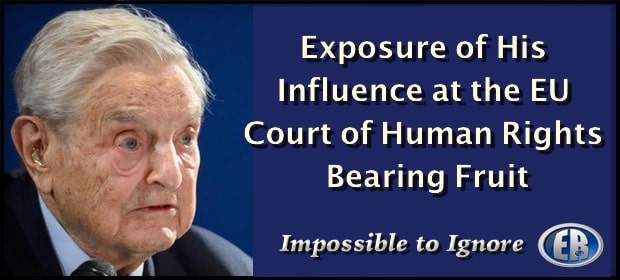
Europe Rejects Candidate for Human Rights Court with Ties to Soros
A report on the connections between judges on the European Court of Human Rights and left-wing billionaire George Soros bears fruit.
JEANNE SMITS for LIFESITE NEWS
A recent report by the European Centre for Law and Justice (ECLJ) shows that numerous judges at the Council of Europe’s Court of Human Rights (ECHR) have close connections with left-wing billionaire George Soros’ Open Society Foundation. Now, in a remarkable victory against the packing of the Court with Soros affiliates, the parliamentary assembly of the Council of Europe rejected the candidacy of yet another Open Society employee. Instead, Frédéric Krenc was chosen, a Belgian lawyer, “less political and more competent,” according to the ECLJ.

“On 20 April 2021, the Parliamentary Assembly of the Council of Europe elected the new Belgium judge to the ECHR. Among the three candidates proposed by the Belgian government was a lawyer employed by George Soros’ Open Society, as is often the case. But for the first time in a long time, the Open Society failed to get its candidate elected, despite its considerable financial and political power. In the end, a Belgian lawyer, less political and more competent, was elected: Mr. Frédéric Krenc, with 148 votes against 81 for the Open Society employee and 29 for Sylvie Saroléa. This is a victory for the independence of the Court, and a fruit of the ECLJ Report on NGOs and the judges of the ECHR,” according to the ECLJ’s website.
The victory is in fact double: Grégor Puppinck, director of the ECLJ, pointed out in his communiqué on the Soros connection that the ambassadors of the 47 member states of the Council of Europe “have just adopted an official text admitting the veracity of the ECLJ’s report on NGOs and judges of the ECHR,” announcing their decision to re-evaluate the effectiveness of the current system of selection and election of the Court’s judges by the end of 2024.
For a major international institution such as the Council of Europe — not to be confused with the (smaller) European Union — to have acknowledged that there is a problem with the ideological proximity with the Open Society Foundation of judges it has itself chosen to designate, indicates that the evidence produced by the ECLJ was of necessity overwhelming.
LifeSite’s Paul Smeaton reported on the ECLJ’s remarkable piece of lobbying on March 11, first recalling the problems posed by the Open Society Foundation that imposes its liberal agenda through massive funding and agit-prop all over the world.
He wrote:
“The OSF is just one of the means utilized by billionaire Soros to push left-wing causes throughout Europe, throughout the United States, and around the world, including abortion, euthanasia, population control, same-sex ‘marriage,’ transgenderism, and more. The OSF spends $940 million annually in 100 different countries, including $150 million per year funding the left-wing American Civil Liberties Union (ACLU), the leading abortion company Planned Parenthood, and other liberal groups.”
“The organization claims to support humanitarian and democratic initiatives around the world but also is documented fomenting social discord — for example, by puppeteering globalist politicians, provoking riots, and pouring money into abortion groups,” he added.
These groups include “Black Lives Matter,” whose propaganda has reached far beyond the U.S.
Puppinck explained that the ECLJ report has found that “at least 22 of the 100 judges who have served since 2009 are former staff or leaders” of the Open Society Foundation (OSF) or a number of NGO’s directly founded by the OSF — seven in total: the Helsinki Committees, the International Commission of Jurists, Amnesty International, Human Rights Watch, Interights and the A.I.R.E. Centre. “Among these, the Open Society Foundation stands out for the number of judges linked to it (12) and for the fact that it actually funds the other six organizations identified in this report,” he added.
Even more shockingly, these judges have sat on at least 88 cases where their former NGO was involved, making them both judge and party.
As Puppinck has now pointed out on the ECLJ’s website, the campaign to expose OSF links to over 20 percent of recent judges of the ECHR was a lengthy and difficult affair because of the complexity of getting the involved institutions to take notice of the report and above all to respond to it.
Puppinck writes:
“The revelations in this report are extremely serious; they circulated around the world but have also been met with silence from the ECHR and with the refusal of the European Commission and some governments to respond to them in substance, to the point of denying the evidence. The most important support for the report came from Mr Lavrov, the Russian Foreign Minister.”
But unexpectedly, the 47 Ambassadors representing the member states of the Council of Europe and as such, its main body, having been seized with three “embarrassing written questions from members of parliament on ‘the systemic problem of conflicts of interest between NGOs and judges of the Court’ and on ‘Restoring the integrity of the European Court of Human Rights’,” decided not to ignore it. This would have been easy if they had invoked an inability to find a common answer: instead, they submitted a written reply.
In their written questions, the parliamentarians pointed to the low number of European judges who had previously served as magistrates, and accused the ECHR of giving too much importance to legal professionals from lobbies; they also denounced the absence of an effective procedure for deferral and recusal in case of a possible conflict of interest. Barna Pál Zsigmond asked “what measures will the Committee of Ministers adopt, in the context of the reform of the Court, to remedy the weaknesses of the system and restore the Court’s credibility?”
Puppinck commented:
“At first glance, this response seems smooth and conventional, but when one reads between the lines, as befits a diplomatic document, the undertones become clear. Here, they are obvious: at no time do the ambassadors contradict or even try to minimize the reality of the facts revealed in the ECLJ report and recalled by the MEPs. This is itself an essential confession, which the European Commission had not conceded. The Council of Europe admits the facts revealed by the ECLJ.”
The ambassadors stated that it will be necessary to “continue to guarantee the highest standard of qualifications, independence and impartiality of the Court’s judges,” also describing “measures taken to that end.” They added that “by the end of 2024, in light of further experience, the effectiveness of the current system for the selection and election of the Court’s judges” will be reassessed.
This is encouraging, for it means that the problems underscored by the ECLJ report appear to be prompting action on the part of the Council of Europe.
In particular, the ECLJ suggested that ECHR magistrates should make a declaration of interests when assuming their new functions. Grégor Puppinck told the French daily le Figaro that this and other conclusions of the report “were implicitly accepted by the Committee of ministers,” since none were rejected in its written reply to the three parliamentarians.
But the campaign for independent judges is far from over. The ECLJ has stated that it “will closely follow this review of the judicial selection mechanism and ensure that its recommendations are taken into consideration.”
The ECLJ will also work to obtain a renewal of procedures allowing applicants to object to the presence of a politically biased judge in their cases. Two new written questions originating in the ECLJ report have already been submitted to the Ambassadors on April 8:
“The first one questions the practical impossibility of requesting the recusal of a judge of the European Court, since the identity of the judges is only revealed once the judgment is published, in violation of the rules imposed by the ECHR on national courts. The other written question concerns the impossibility of applying for a revision of certain judgments of the Court.”
************
Source

••••
The Liberty Beacon Project is now expanding at a near exponential rate, and for this we are grateful and excited! But we must also be practical. For 7 years we have not asked for any donations, and have built this project with our own funds as we grew. We are now experiencing ever increasing growing pains due to the large number of websites and projects we represent. So we have just installed donation buttons on our websites and ask that you consider this when you visit them. Nothing is too small. We thank you for all your support and your considerations … (TLB)
••••
Comment Policy: As a privately owned web site, we reserve the right to remove comments that contain spam, advertising, vulgarity, threats of violence, racism, or personal/abusive attacks on other users. This also applies to trolling, the use of more than one alias, or just intentional mischief. Enforcement of this policy is at the discretion of this websites administrators. Repeat offenders may be blocked or permanently banned without prior warning.
••••
Disclaimer: TLB websites contain copyrighted material the use of which has not always been specifically authorized by the copyright owner. We are making such material available to our readers under the provisions of “fair use” in an effort to advance a better understanding of political, health, economic and social issues. The material on this site is distributed without profit to those who have expressed a prior interest in receiving it for research and educational purposes. If you wish to use copyrighted material for purposes other than “fair use” you must request permission from the copyright owner.
••••
Disclaimer: The information and opinions shared are for informational purposes only including, but not limited to, text, graphics, images and other material are not intended as medical advice or instruction. Nothing mentioned is intended to be a substitute for professional medical advice, diagnosis or treatment.




